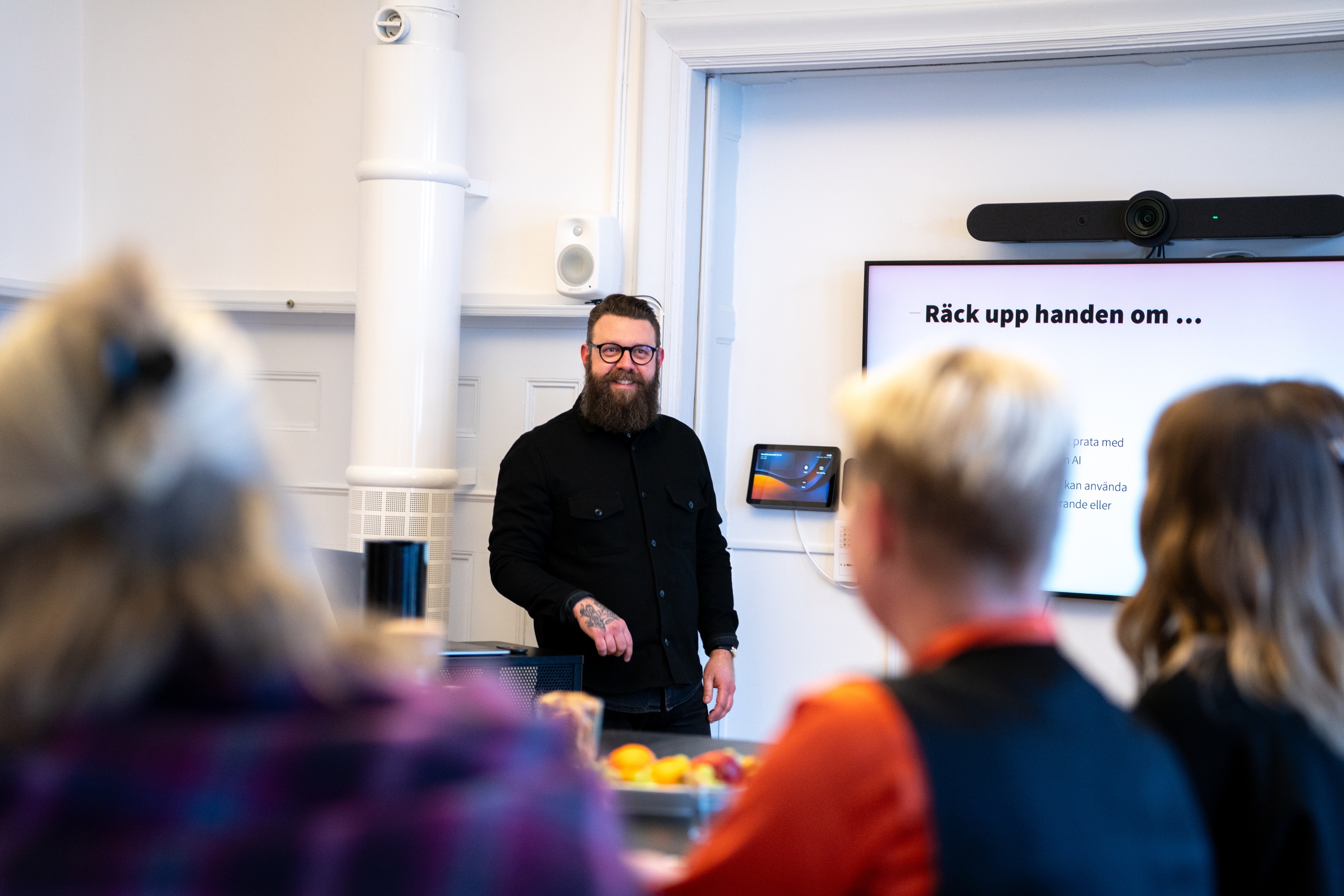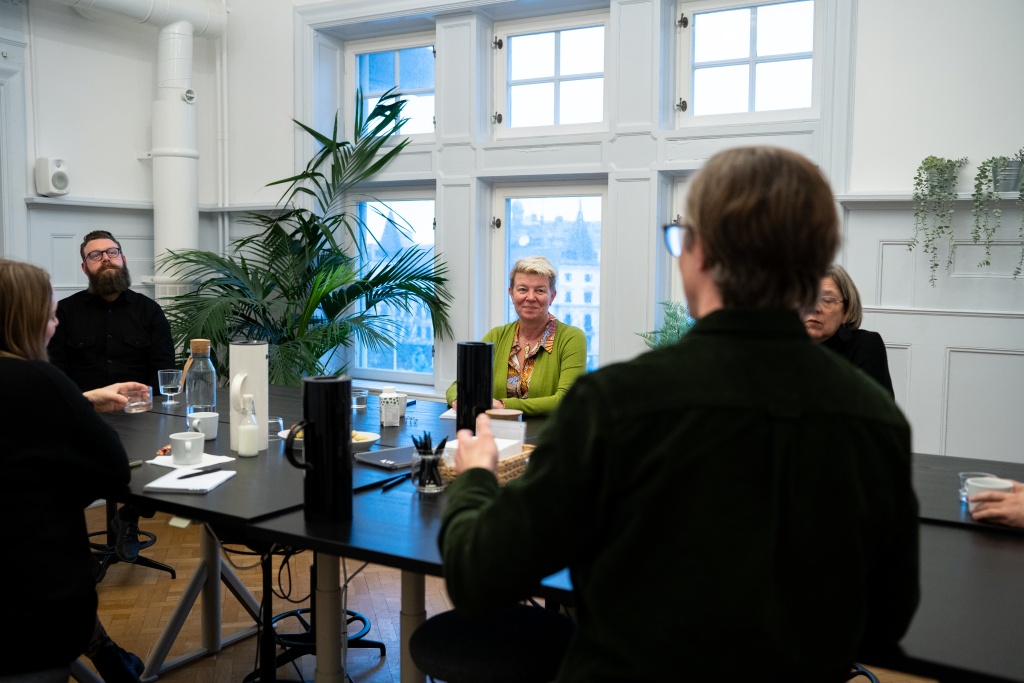The Paradigm Shift – AI in the Communication Industry Roundtable Discussion at KAN: Insights from Our Clients and Partners on AI

The entry of AI technology into the digital landscape will, with all certainty, influence us and change how we operate in the future. To gain a clearer understanding of what this means for those of us working in communication, we invited clients and partners to a roundtable discussion.
A lot has happened in the past year. Services like ChatGPT and Midjourney have gained significant traction despite being available to the public for a relatively short period. Additionally, we continually receive new integrated AI in the digital tools we use every day.
At KAN, we are continuously exploring the possibilities of AI. But how do others perceive the AI revolution? With Johan Toresson, one of KAN’s digital strategists, in the lead, we invited clients and partners to a series of roundtable discussions earlier this year. The discussions revolved around three themes: economic potential, AI-enhanced digital work, and virtual workforce.
“At KAN, we have a motto that we call ‘working with friends.’ This means that we see both our colleagues and clients as friends. In times of change, we believe that strength comes from unity. We saw these discussions as opportunities to inspire, assist, and learn from our clients and partners,” Johan says.
Participants in the discussions came from various business sectors and types of companies, and many of them work in communication. They were curious to learn how other participants perceive and utilize AI in their professional roles.
“It was gratifying to see that the roundtable discussion attracted people from diverse niches, from the packaging industry and energy sector to tech and non-profit organizations. This diversity allowed us to gain different perspectives and identify various needs. It was also exciting that nine out of ten participants were women, many in senior positions,” Johan adds.
Policies – How Do We Use AI?
Few of the participants’ employers currently have established policies or guidelines for the use of AI in the workplace. Everyone agreed that a young and curious perspective is needed when creating an AI policy to leverage the opportunities rather than being restrictive.
“Many remember what it was like when social media made its debut – the company policies that followed were very strict and cautious. With today’s hindsight, it’s definitely fair to say that many overreacted initially, only to adapt to the new reality later. Here, it is probably especially important to incorporate the opinions of the younger generation, those who may see AI as a more natural part of both their work and daily lives,” Johan says.
At the same time, AI is also a security issue for many companies. What type of data can, or should, one share with AI? Where does the input go before you get your output? This uncertainty makes many companies cautious.

Less Administrative Work – More Business Value
All participants in the discussions agreed that AI-enhanced tools and assistants are good at making us more efficient. And when we are efficient, we free up time for what we are actually meant to do, regardless of our roles. As AI improves, many believe that tasks such as translation and first-line support can be automated, especially if the AI in question can be trained on a company’s specific data and brand tone. As one of the participants said when the discussion turned to economic aspects:
“When administrative tasks and information gathering are handed over to AI, we can extract much greater business value from each individual employee.”
AI Etiquette
The discussion about AI-generated content also touched on ethics and honesty. Is it important to indicate where a text, image, or video comes from? In the discussions, some felt that AI-generated content should be labeled and disclosed, while others did not attach much importance to it. As a communications agency, we concluded that we will have an important role as guides in such matters in the future – helping our clients communicate both honestly and responsibly.
But… Is AI Good Enough?
A utopia for many participants was to be able to delegate tasks to AI tools or assistants entirely without human involvement. Preferably repetitive and information-heavy tasks that are already somewhat “robotic” in nature. However, there was consensus that the technology simply isn’t there yet. Text-based AI tools, for example, often contain factual and language errors that still require human quality control.
This also led to a discussion about whether AI will give us entirely different tasks in the future. Instead of content creators, will we be some sort of validators of AI-generated content?
“The development is currently moving incredibly fast. So, a future where AI can completely take over certain tasks isn’t far off at all, I believe. Until then, we simply must take advantage of the opportunities for efficiency, even if we still need a final human touch on the output,” Johan concludes.
The Discussion Continues
In addition to encouraging our participants to continue the discussion with colleagues, friends, and family, we at KAN will continue to explore AI and what the technology can do for us and our clients.
Currently, we have two active client projects where we are investigating whether a GPT – a customized AI bot – can assist us. It has been a very educational process. We will also continue our roundtable discussions, both internally and with others in the industry, both in Malmö and Stockholm- Johan concludes.

Do you want to participate in a roundtable discussion? Contact me
